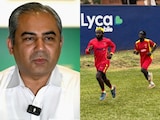On February 4, 2019, gloom settled over the iconic Brigade Parade grounds in the heart of Kolkata. Kanhaiya Kumar, then a firebrand Left leader known for his rousing speeches, had cancelled his visit to a rally just before the upcoming Lok Sabha election.
As dejected Left supporters started filing out of the dusty grounds, an announcement from the dais stopped them. A surge of energy swept over the crowd, rarely witnessed at a Left rally since their humiliating 2011 defeat in West Bengal.
In a car somewhere in the vicinity sat a pale Buddhadeb Bhattacharjee, in his signature white kurta, on oxygen support. Though he stayed in the car due to his multiple health complications, the news of his presence was enough to electrify the rally crowd.
The loud cheers the city witnessed that day sums up the icon that Buddhadeb Bhattacharjee – Buddha Babu - was in Bengal politics. The former chief minister died at 80 on Thursday.
He was best known as the Leftist who did not compromise on development regardless of his party ideology.
But history will be cruel to Buddhadeb Bhattacharjee. He will be remembered as the last Left chief minister of West Bengal, who led the party to a defeat that it never recovered from. In his nearly four decades in active politics, he saw the rise and fall of Communists in Bengal.
A stalwart of Left politics in India, he won his debut election in 1977, the same year his party came to power, from the Cossipore constituency of north Kolkata. In his first stint as MLA, he was given charge of the Ministry of Information and Culture.
He lost the next election but bounced back in 1987 after he switched to the Jadavpur constituency.
In 2000, when Jyoti Basu decided to step down on health grounds after 23 years in power, Buddhadeb Bhattacharjee stepped into the shoes of his mentor, beginning a new era of Left politics.
In the 2001 Bengal polls, Mr Bhattacharjee won an overwhelming mandate, with the Left scooping up 196 of 295 seats. The seat share was much higher than the previous elections, but the opposition had changed. Instead of the Congress, his closest rival was former Congress leader Mamata Banerjee, whose Trinamool Congress had managed an impressive 60 seats.
The brick-red Writers building, which served as the state secretariat back then, would not remain the Left's bastion for long.
Since the 1970s, the Left's stronghold on Bengal had seemed unshakeable.
Bhattacharjee faced his biggest test during the Singur and Nandigram uprisings that eventually brought about his government's downfall. Both controversies were linked to allegations of forced land acquisition by the government for developmental projects - something that the Left had been dead against for all of three decades.
Writing about his mentor Jyoti Basu, Derek Brown of The Guardian had once said that the "communist rule has denied Kolkata the new prosperity visible in other centres such as Delhi and Mumbai". Bhattacharjee wanted to undo exactly that. He valued modernism.
Bengal witnessed rapid industrialisation during his last few years as chief minister. Statistics show he had steered the state to the fourth position in terms of industrial growth during his final years in power.
But it was too late.
While Mamata Banerjee's 25-day fast in Singur established her as a strong leader who would protect the rights of farmers, indiscriminate police action on protesters killing 14 agitators vastly weakened the possibility of the Left returning to power.
2011 marked the end of Left rule in West Bengal, and Bhattacharjee faded away from active politics.
The defeat was humiliating for Bhattacharjee, who quietly receded from the spotlight, though in his own words, he never stayed away from public life.
Flashforward 2019, he kept his word. To campaign for his party ahead of the Lok Sabha elections, he returned to the Brigade Parade grounds, albeit on oxygen support, inside a car. The crowds were ecstatic, but voters had turned cold to the Left.
In two more years, his party would be wiped out of the state assembly.















